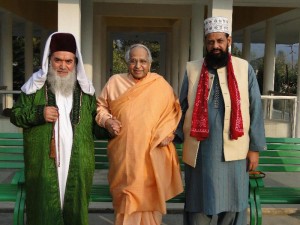GPIW Summary Report, Sufi Yogi Dialogue

> Himalayan Yoga Tradition Rishikesh, India <
> Sufi-Yogi Dialogue Summary Report <
Sufism or taṣawwuf (Arabic: تصوّف), also spelled tasavvuf according to the Persian pronunciation, is generally understood to not be a distinct sect of Islam, but the inner, mystical dimension of Islam.A practitioner of this tradition is generally known as a ṣūfÄ� (صُوفِيّ), though some adherents of the tradition reserve this term only for those practitioners who have attained the goals of the Sufi tradition. Another name used for the Sufi seeker is Dervish. Classical Sufi scholars have defined Sufism as „a science whose objective is the reparation of the heart and turning it away from all else but God.“ Alternatively, in the words of the renowned Darqawi Sufi teacher Ahmad ibn Ajiba, „a science through which one can know how to travel into the presence of the Divine, purify one’s inner self from filth, and beautify it with a variety of praiseworthy traits. Read More: > HERE <
From January 27th to February 1st, 2010, Hindu and Muslim religious leaders from India, Pakistan and Afghanistan met to explore how they could work more closely to form a spiritual alliance to ease tensions, counter extremism, and set a new tone for the region. The Sufi-Yogi Dialogue took place in a land famous for spiritual seers and sages, Rishikesh, on the banks of the sacred Ganges River in India. Organized by the Global Peace Initiative of Women, the Dialogue was facilitated by Dena Merriam, GPIW Founder and Convener, along with Swamini Pramananda, and hosted jointly with Swami Veda Bharati of the Swami Rama Sadhaka Grama and the Association of Himalayan Yoga Meditation Societies International.
GPIW Summary Report – Sufi Yogi Dialogue
Coming to the One through the Many
From January 27th – February 1st, 2010
the Global Peace Initiative of Women brought a delegation of
Hindu and Muslim spiritual leaders from India,
Afghanistan and Pakistan to form a spiritual alliance
On the banks of the sacred river Ganga
in Rishikesh, India
During the course of the four days, leaders from the Sufi and Yogic traditions spoke in great depth about the common ground between them and expressed great interest in learning more about each other’s practices and forming a new partnership for peace. The gathering was not a typical interfaith meeting as the leaders came together to explore a much deeper engagement, to re-discover and strengthen their ancient shared spiritual roots as a means to meet the contemporary challenges of the region and begin to resolve present-day conflicts between the two great cultures of Hinduism and Islam.
The Sufis and Yogis in particular were chosen for this ground-breaking dialogue because they represent the mystical core of the Islamic and Hindu traditions respectively. As such, they are especially suited to distilling the common essence of unity, the direct experience of the Divine, at the heart of both religions – and perhaps ultimately of all religious experience. Tapping into this inner source of unity, common to all spiritual paths at their innermost level, has the potential to guide us to outer unity in our crisis-torn world. It is in this deep meeting at the essential core of our Being that we can best experience our true identity with the Divine, which can then serve as a fulcrum for global healing and harmony.
The Hindu leaders represented Yogic, Vedantic and Kashmiri Shaivite traditions from different parts of India, while the Sufi leaders represented orders in Pakistan and Afghanistan, as well as Kashmir in India.
Meet Kashmir Sufism Society, friends and Studies at fb <
Meet Support Internal Displaced Kashmirian Indigenous at fb<
SAVE A SMILE & DIE Kashmir Shivaiten im Himalaya Gebirge <
SUFI POETRY – The appeal of Sufi poetry is universal, great Sufi Poets such as Rumi, Hafiz and Omar Khayyam are appreciated by both Sufi’s and non Sufi’s alike. This is because their poetry expresses the universal aspirations of spiritual seekers .
More interesting Articles, Contacts about Islam, Medicine, Sufi Arts and Culture:
Yoga, Bhakti Movement, Sufism, Islamic Arts and Culture
Islamic Plant Medicine and History
Die Kashmir Shivaiten im Himalaya, Zentrum Interkulturell
Omkareswhar, Schulprojekt, Bhajans, Kirtan Lieder der Freude und Liebe
Omkareshwar, Shiva PURANAS, 12 Seats of the Lord
Kashmir Overseas USA, Save A Smile Project, Hospital Research Center
UNESCO, Shiva Puranas, Maha Puranas, World Digital Library
BYO – Österr. Yoga Verband, Austrian Yoga Alliance: www.yoga.at – ” Eintreten in das Göttliche Bewusstsein” – Die Spiritualität des kashmirischen Shivaismus.
SHAMBALA SUN – GPIW at UN at Climate Change
GPIW – Charter For Compassion
Kashmir: Sufis, Saints and Shrines
Hazrat Nasir Mohammed Fakir Soofi Alquadri
Mowlana Jalaluddin Rumi
Music of Kashmir
Dhwani Kathak Dance, Music Academy
Meet Kashmir Sufism Society , friends and Studies at fb <
Meet Kashmir Shaivaism, friends and Studies at fb <
Meet Swami Mangalananda, friends at fb <
Meet GLOBAL ONESS PROJECT, friends at fb <
Comments are closed.